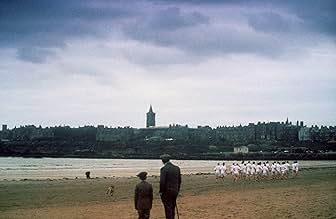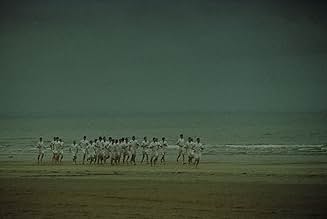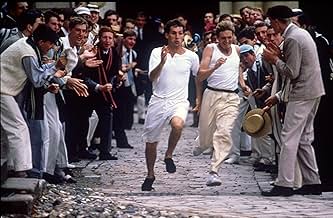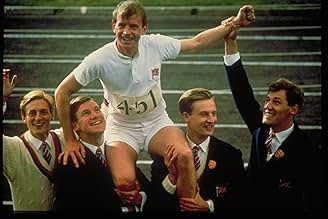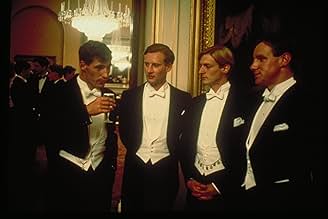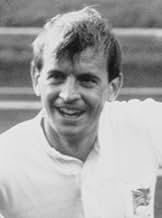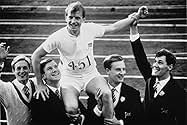La storia della rivalità fra due atleti inglesi che si preparano a partecipare alle olimpiadi del 1924. Entrambi sono spronati da motivi personali e sociali ben diversi tra loro.La storia della rivalità fra due atleti inglesi che si preparano a partecipare alle olimpiadi del 1924. Entrambi sono spronati da motivi personali e sociali ben diversi tra loro.La storia della rivalità fra due atleti inglesi che si preparano a partecipare alle olimpiadi del 1924. Entrambi sono spronati da motivi personali e sociali ben diversi tra loro.
- Regia
- Sceneggiatura
- Star
- Vincitore di 4 Oscar
- 18 vittorie e 19 candidature totali
John Gielgud
- Master of Trinity
- (as Sir John Gielgud)
Recensioni in evidenza
I beg to differ with several previous reviewers. This film is neither bland nor is it solely about professionalism vs. amateurism.
This film is about what drives people to do what they do. Eric Liddell (Ian Charleson) runs for the glory of God, whereas Harold Abrahams (Ben Cross) runs to prove his worth to a society that was anti-Semitic. Even though they run for different reasons, their drive and determination spur them on. They stand up for what they believe in and refuse to sacrifice their principles because it is the easy way out.
The supporting cast is also extraordinary, with Nigel Havers, Nicholas Farrell, Ian Holm and Sir John Gielgud all making important contributions to the final product.
There is absolutely nothing unnecessary in this film. The writing, the direction, the acting, the dialogue are all outstanding. And then there's that haunting score.
Once again, this is truly an outstanding film. One with universal themes that transcend time and place.
This film is about what drives people to do what they do. Eric Liddell (Ian Charleson) runs for the glory of God, whereas Harold Abrahams (Ben Cross) runs to prove his worth to a society that was anti-Semitic. Even though they run for different reasons, their drive and determination spur them on. They stand up for what they believe in and refuse to sacrifice their principles because it is the easy way out.
The supporting cast is also extraordinary, with Nigel Havers, Nicholas Farrell, Ian Holm and Sir John Gielgud all making important contributions to the final product.
There is absolutely nothing unnecessary in this film. The writing, the direction, the acting, the dialogue are all outstanding. And then there's that haunting score.
Once again, this is truly an outstanding film. One with universal themes that transcend time and place.
What an amazing movie it is... amazing is the word! I saw the movie today - on the 5th of Feb '09. What a pity that i couldn't experience the movie's aura earlier!
Chariots of Fire is an outstanding piece of work which may be easily, and deservedly so, termed as LEGENDARY! Watch this movie and you'll know what is inspiration and dedication...
The characterization is such exemplary that each and every character tell their own little story... The two main characters - Lindell and Abrahams - are such that you'll only want to know them better as you go on watching the movie... especially that of Lindell. The guy is so so dedicated and truthful that i for one would just feel honored to know him closely.
Guys, WATCH IT!!!!!!!!!!!!
Chariots of Fire is an outstanding piece of work which may be easily, and deservedly so, termed as LEGENDARY! Watch this movie and you'll know what is inspiration and dedication...
The characterization is such exemplary that each and every character tell their own little story... The two main characters - Lindell and Abrahams - are such that you'll only want to know them better as you go on watching the movie... especially that of Lindell. The guy is so so dedicated and truthful that i for one would just feel honored to know him closely.
Guys, WATCH IT!!!!!!!!!!!!
"Chariots of Fire" is a fine motion picture that won the Best Picture Oscar in 1981, even though it was the longest of long-shots. The film deals with two young Englishmen (Ben Cross and Ian Charleson) who have hopes of glory at the 1924 Olympics. We see that their struggles almost cost them the opportunity to achieve the greatness that they both desire. When they are both ultimately successful, Charleson feels that his win is due to God's glory and accepts the medal with the greatest of pride and admiration. However, after Cross wins the gold he feels somewhat disappointed and realizes that what he thought he wanted was not what he really wanted at all. The insight into this motion picture is amazing. Both athletes convey very common feelings that most people experience if they are serious enough in what they are doing, whether it be sports or something else. The main focus of "Chariots of Fire" is that the journey to get to the destination is more important and uplifting than the destination itself. Many question the fact that this film won the Best Picture Oscar over "Reds" and "Raiders of the Lost Ark". However, this is one time I cannot say anything negative about the Academy's decision. The fact that this film won in 1981 is testimony to the fact that the Academy is one of the greatest organizations in the world. Kudos to all involved here. 5 stars out of 5.
The strength of this movie is the study in character contrast and development, with the added attractions of a historical setting and the soaring, ethereal musical score of Evangelos Papathanassiou.
The film is anchored in the character study of the introspective, brooding, and complex persona of Harold Abrahams, wonderfully portrayed by Ben Cross. Here is a man with all of the outward trappings of success: academic achievement, unexcelled athletic ability, wildly popular with his peers, yet tortured by an inbred inferiority complex and driven to lash out at the world in response. In the end, he conquers his inner demons through hard work, sacrifice, understanding of his fellow man, and the love of a good woman, to whom he opens his heart. I found myself thinking that Harold Abrahams is the kind of man I would want as my best friend, yet at the same time would find hard to become close with and relate to.
Ian Charleston's character (Eric Liddell) is a bit more one-dimensional. He is the archetypical Good Man, faithful to his family, his country, his friends, and his God. And in the end he triumphs through sheer force of will and by tapping that reservoir of inner strength that sustains him. As the crusty coach Sam Mussambini says, "He's a gut runner. Digs deep...".
It's a bit of a pity that the movie, long though it is, could not have delved more deeply into the other characters' background. Lord Andrew Lindsey is particularly appealing as Harold's and Eric's faithful friend who gives up his spot in his specialty race (the 400 m) to allow Eric a chance at the gold. Sybil Gordon is wonderful as Harold's love interest who tries to draw him out of his lonely world of bitterness and resentment and self-hatred ("You ran like a God. I was proud of you...", even after Harold loses a race for the first time in his life to a more determined Eric). Even some of the American competitors, who are only peripherally portrayed in the concluding segments, lend some color. Jackson Scholtz' reaching out to Eric Liddell gives one the sense that he knows the greatness of spirit that quietly resides in this unassuming Scotsman.
Its a wonderful story wonderfully told, and when its over you find yourself longing for it to continue, to see how these characters we've come to know over the previous two hours will turn out in the rest of their lives. Alas, the story of their lives is noted only in subtitles as the film closes.
The film is anchored in the character study of the introspective, brooding, and complex persona of Harold Abrahams, wonderfully portrayed by Ben Cross. Here is a man with all of the outward trappings of success: academic achievement, unexcelled athletic ability, wildly popular with his peers, yet tortured by an inbred inferiority complex and driven to lash out at the world in response. In the end, he conquers his inner demons through hard work, sacrifice, understanding of his fellow man, and the love of a good woman, to whom he opens his heart. I found myself thinking that Harold Abrahams is the kind of man I would want as my best friend, yet at the same time would find hard to become close with and relate to.
Ian Charleston's character (Eric Liddell) is a bit more one-dimensional. He is the archetypical Good Man, faithful to his family, his country, his friends, and his God. And in the end he triumphs through sheer force of will and by tapping that reservoir of inner strength that sustains him. As the crusty coach Sam Mussambini says, "He's a gut runner. Digs deep...".
It's a bit of a pity that the movie, long though it is, could not have delved more deeply into the other characters' background. Lord Andrew Lindsey is particularly appealing as Harold's and Eric's faithful friend who gives up his spot in his specialty race (the 400 m) to allow Eric a chance at the gold. Sybil Gordon is wonderful as Harold's love interest who tries to draw him out of his lonely world of bitterness and resentment and self-hatred ("You ran like a God. I was proud of you...", even after Harold loses a race for the first time in his life to a more determined Eric). Even some of the American competitors, who are only peripherally portrayed in the concluding segments, lend some color. Jackson Scholtz' reaching out to Eric Liddell gives one the sense that he knows the greatness of spirit that quietly resides in this unassuming Scotsman.
Its a wonderful story wonderfully told, and when its over you find yourself longing for it to continue, to see how these characters we've come to know over the previous two hours will turn out in the rest of their lives. Alas, the story of their lives is noted only in subtitles as the film closes.
I watched this again last night. I had forgotten just how beautifully done it was - both a character study of two very different men and a gripping plot of their attempts to succeed - partly through athletics. the writer and director so well convey both Cambridge and the Edinburgh Presbyterian missionary disciples, in the early 1920s so very well.
The acting is superb - I had never seen a character presented like Eric Liddell in movies - how fine Ian Charleson was in this role, the softness of his voice, his ease and joy in running competitively (especially in contrast with the tense tortured Harold Abrahams). I also loved the more supporting roles - I've read a biography of F.E. Smith and Nigel Davenport is exactly how I would imagine him. The actor who played the Prince of Wales also seemed exactly right with his effortless charm, looks, and lack of imagination. Ian Holm, John Gielgud, Lindsay Anderson - all wonderful.
The actors weren't chosen for glamour either - Liddell and Abrahams are not Leni Riefenstahl images of athletic ideals, Liddell's sister is no beauty - and Abrahams' girlfriend is pretty but not stunning. It made them seem more real. (In nice contrast were the near-pretty boy looks of Nigel Havers as Lord Lindsay - it so suited his character).
The races are riveting - partly due to the music and sound effects.
So many small things are done so well - e.g., when Lord Lindsay has the confidence of his class to barge into a room containing the Prince of Wales, and three other lords (including Birkenhead and the head of the British Olympic Committee) and greets them by name - no need for introduction there (as there was for Liddell). It's small but seems quite real.
As an American, it was interesting and funny to see our Olympic team shown as the numerous, ominous, invulnerable "other"! (something like watching a Rocky movie with Rocky as the product of a Russian or East German success machine!). In fact, the one scene that seemed a bit off was the scene of the American track athletes warming up for the Games - all heavy music, machine like athletes, ferocious coach yelling with a megaphone into people's ears. It pounded too hard on the "these are the scary almighty inhuman opponents" theme in contrast to the cheerful British boys running along the beach.
Something I had forgotten about the movie was how stubborn BOTH protagonists are - Liddell fully as much as Abrahams. Liddell is not overly deferential or bashful when dealing with the Prince of Wales - but instead straightforward and very firm.
I truly can't understand anyone not liking this movie - it is very exciting even on the basic level of "will they win?" and so much more. (For example, Ian Holm's character's reaction to success after 30 years is very moving). Those who write to say that "Reds" deserved the Oscar more - are simply wrong. (Reds was so simplistic that it felt like watching the movie "The Hardy Boys Go to the Russian Revolution"). Those who say they cannot differentiate among the boys or between the Scottish and English accents - well, it sounds like some political statement to me.
Do watch it - it's very fine, very moving, very exciting.
The acting is superb - I had never seen a character presented like Eric Liddell in movies - how fine Ian Charleson was in this role, the softness of his voice, his ease and joy in running competitively (especially in contrast with the tense tortured Harold Abrahams). I also loved the more supporting roles - I've read a biography of F.E. Smith and Nigel Davenport is exactly how I would imagine him. The actor who played the Prince of Wales also seemed exactly right with his effortless charm, looks, and lack of imagination. Ian Holm, John Gielgud, Lindsay Anderson - all wonderful.
The actors weren't chosen for glamour either - Liddell and Abrahams are not Leni Riefenstahl images of athletic ideals, Liddell's sister is no beauty - and Abrahams' girlfriend is pretty but not stunning. It made them seem more real. (In nice contrast were the near-pretty boy looks of Nigel Havers as Lord Lindsay - it so suited his character).
The races are riveting - partly due to the music and sound effects.
So many small things are done so well - e.g., when Lord Lindsay has the confidence of his class to barge into a room containing the Prince of Wales, and three other lords (including Birkenhead and the head of the British Olympic Committee) and greets them by name - no need for introduction there (as there was for Liddell). It's small but seems quite real.
As an American, it was interesting and funny to see our Olympic team shown as the numerous, ominous, invulnerable "other"! (something like watching a Rocky movie with Rocky as the product of a Russian or East German success machine!). In fact, the one scene that seemed a bit off was the scene of the American track athletes warming up for the Games - all heavy music, machine like athletes, ferocious coach yelling with a megaphone into people's ears. It pounded too hard on the "these are the scary almighty inhuman opponents" theme in contrast to the cheerful British boys running along the beach.
Something I had forgotten about the movie was how stubborn BOTH protagonists are - Liddell fully as much as Abrahams. Liddell is not overly deferential or bashful when dealing with the Prince of Wales - but instead straightforward and very firm.
I truly can't understand anyone not liking this movie - it is very exciting even on the basic level of "will they win?" and so much more. (For example, Ian Holm's character's reaction to success after 30 years is very moving). Those who write to say that "Reds" deserved the Oscar more - are simply wrong. (Reds was so simplistic that it felt like watching the movie "The Hardy Boys Go to the Russian Revolution"). Those who say they cannot differentiate among the boys or between the Scottish and English accents - well, it sounds like some political statement to me.
Do watch it - it's very fine, very moving, very exciting.
Oscars Best Picture Winners, Ranked
Oscars Best Picture Winners, Ranked
See the complete list of Oscars Best Picture winners, ranked by IMDb ratings.
Lo sapevi?
- QuizWhen Colin Welland completed his first draft, the only title he could come up with was "Runners". Then, one Sunday evening he turned on BBC's religious music series Songs of Praise (1961), featuring the hymn "Jerusalem," with lyrics from a poem by William Blake. The chorus included the words "Bring me my chariot of fire". The writer leaped to his feet and shouted to his wife, "I've got it, Pat! 'Chariots of Fire'!" (The "Jerusalem" hymn is featured at the beginning and end of the movie.)
- BlooperWhen signing an autograph for a young fan, Eric Liddell does not unscrew or remove any cap from the pen he uses. As all fountain pens have caps, he seems to be using a modern day ballpoint pen which was not invented until 1938.
- Citazioni
Eric Liddell: I believe God made me for a purpose - but He also made me fast. And when I run, I feel His pleasure.
- Versioni alternativeThere is at least one slightly different version of the movie, issued in Europe on homevideo. The beginning is different - shorter - and introduces Harold Abrahams while playing cricket with his colleagues. The scene in the train station, where Monty meets Harold is absent, as well as the loading of the baggage in the taxi they share. We simply see Monty writing a letter to his parents, mentioning that "Harold is as intense as ever" (cut to the cricket scene, maybe 30 seconds long), and then continues with "I remember our first day... we shared a taxi together" (cut to the two students unloading their stuff from the car). This alternate version also have slightly different end credits, and does not mention Harold marrying Sybil. The differences are minor (the U.S. version provides a more shocking memento of WWI, when it shows crippled baggage handlers in the station); one of the reasons the cricket scene was dropped in favour of the station one was due to the distributor's worry that the American market would not understand it.
- ConnessioniFeatured in Vangelis: Chariots of Fire (1981)
- Colonne sonoreHe is an Englishman
(1878) (uncredited)
from "H.M.S. Pinafore"
Music by Arthur Sullivan
Lyrics by W.S. Gilbert
I più visti
Accedi per valutare e creare un elenco di titoli salvati per ottenere consigli personalizzati
- How long is Chariots of Fire?Powered by Alexa
Dettagli
- Data di uscita
- Paese di origine
- Lingue
- Celebre anche come
- Carros de fuego
- Luoghi delle riprese
- Aziende produttrici
- Vedi altri crediti dell’azienda su IMDbPro
Botteghino
- Budget
- 5.500.000 USD (previsto)
- Lordo Stati Uniti e Canada
- 58.972.904 USD
- Fine settimana di apertura Stati Uniti e Canada
- 68.907 USD
- 27 set 1981
- Lordo in tutto il mondo
- 59.317.376 USD
- Tempo di esecuzione2 ore 5 minuti
- Colore
- Mix di suoni
- Proporzioni
- 1.85 : 1
Contribuisci a questa pagina
Suggerisci una modifica o aggiungi i contenuti mancanti







